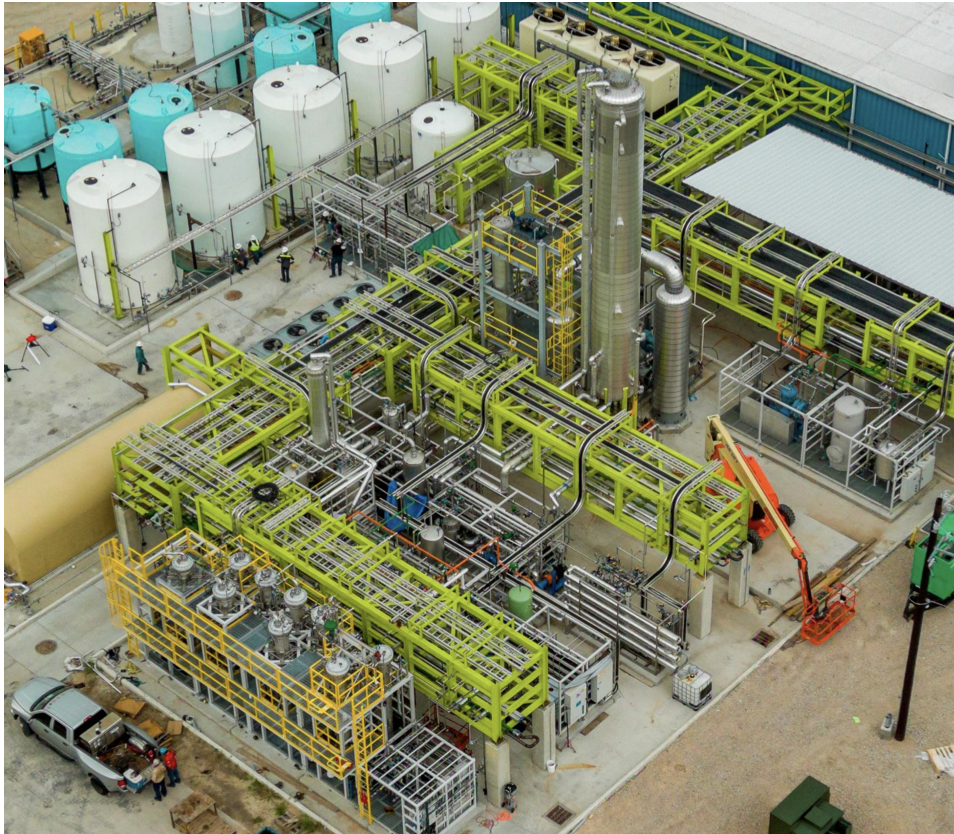Somebody asked me a month ago what information I have on the Texas, USA-based start-up firm Solugen. Unfortunately, I had very little in my archives since I started hearing about the company in early 2019 when it received $13.5 million in financing from investment firms Founders Fund, Fifty Years and Y combinator. The company was founded in 2016 and has a 100 tpa pilot plant in Houston, which started operation in 2018. The company’s chemical-enzymatic process called Bioforge can reportedly convert sugar, air and carbon dioxide into various chemicals without wastewater discharge or air emissions. The cell-free manufacturing process combines engineered enzymes with metal catalysts under an artificial intelligence (AI)-enabled process control, and the technology reportedly allows for modular rapid construction.
Back in 2019, Solugen was initially setting its sight on producing bio-based peroxide for water treatment applications in the upstream oil and gas sector and announced its planned 10 ktpa capacity to be built in Houston. After two series B rounds of financing (worth $62m) in 2019 and 2020, the company started construction in 2020 and commissioned its Bioforge facility in 2021. Solugen also had its series C financing round of $350 million last year led by GIC and Baillie Gifford with participation from Temasek Holdings, funds and accounts managed by BlackRock, Carbon Direct Capital Management, Refactor Capital and Fifty Years.
Solugen has been running its 10 ktpa modular Bioforge facility for over a year and is reportedly producing high-commodity and specialty chemicals with high margins. Last year, Solugen reportedly shipped over 50 million pounds of products and launched four molecules (organic acids and aldehydes). The company noted that it can produce, as an example, completely pure salt-free glucaric acid as well as a 50/50 composition of glucaric acid and gluconic acid. It has also been working with AkzoNobel on the development of bio-based hydrogen peroxide.
Early this month, the company announced that it has raised over $200 million in series D fundraising, raising its valuation above $2bn. Leading the financing was climate tech investors Kennivik, Lowercarbon Capital and Refactor Capital. I attended the AFCC (Alternative Fuels and Chemicals Coalition) bioeconomy conference earlier this month and heard a presentation from Solugen. Compared to products manufactured via traditional petrochemical reaction (~60% yield) and fermentation process (~40% yield), the cost advantage of Solugen’s process includes its cell-free manufacturing proprietary software that engineers the host cells to create specific enzymes which have 100% specificity and over 90% yield of the desired chemical. Also, unlike traditional synthetic biology, where a company re-engineer the entire cell, cell-free manufacturing focuses on extracting only the enzymes needed via fermentation. The isolated enzymes are not living cells so they are less complex and do not produce carbon dioxide. The company started producing its BioChelate water treatment made for sugar in 2020, and it now sells the product to a network of water treatment service providers.
Fast Company wrote an interesting explanation of the company’s Bioforge process in this link. The sugar is fed in a columned enzyme reactor, where a specific intermediate chemical is produced. As the enzyme reaction happens, the chemical is continuously harvested by passing through membranes that filter out the enzymes. In the thermochemical reactor, the intermediate chemical is pressurised and pumped over metal catalysts in a ‘trickle-bed’ reactor turning it into the final desired organic acids, aldehydes, etc.
Solugen’s technology reportedly allows for rapid modular construction. Bioforge 1 reportedly took 11 months from greenfield through construction, commissioning and production of the first molecule. The recent funding will enable the company to expand the Houston facility to 20 ktpa, and break ground on Bioforge 2 next year, which will be located in Minnesota with an initial capacity of 50 ktpa and expandable to 100 ktpa by 2024. The company hopes to reach more than 250 ktpa of capacity in the next five years with plans to establish two facilities overseas. Solugen expects to develop more new molecules by next year, including HMDA (hexamethylene diamine) and other monomers.
I am looking forward to speaking with the company soon. And to our US readers, I wish you a very Happy Thanksgiving holiday!

Solugen’s 10 ktpa Bioforge facility in Houston, Texas. Source: Solugen
Discussion
Comments are closed.